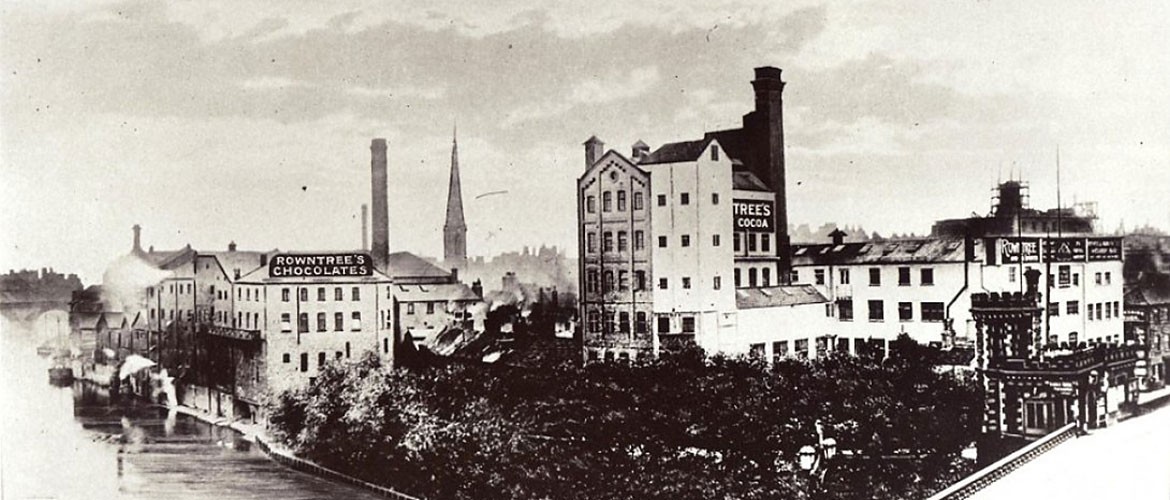Read and listen to all the memories on The Rowntree Society website
For details of the Festival Of Ideas events about Rowntree’s, go here
At its peak, the Rowntree works was a town within a town. The factory had its own fire brigade, classrooms and sports facilities, and generations of the same families worked within its walls.
Now some marvellous memories of working at Rowntree’s have been unearthed. For the 18-month York Remembers Rowntree project, researchers recorded nearly 40 in-depth interviews with former employees. talking about their memories of Rowntree’s.
They also collected around 1,000 postcards with bite-sized reminiscences as part of the project, funded by the Heritage Lottery Fund and hosted by the Rowntree Society.
Transcripts and recordings of the interviews are available on an interactive map on the Rowntree Society website. And the project is being celebrated with as series of events during the York Festival of Ideas – see panel for links.
Here are a few memories of Rowntrees in words and pictures…
Strict and noisy

“Every Thursday we’d go to school across the road where the dining block was. And we’d have PE and tennis and rounders, and talks on sex and various things.”
Later Hilda was taught the trickier business of packing chocolates.
“People probably won’t remember now, it was a little box called Phantom. It was a red box – it didn’t last very long – and there would be about a quarter of a pound of chocolates in.”
It was hard not to give into temptation at first.
Eventually you got tired, you didn’t want one.
It could be quite a noisy atmosphere.
At the end of the war, Hilda was packing vitamin chocolate for men in the forces.
We’d have been in trouble if we’d been caught.
Her mum also worked at Rowntree’s.
During the war her mother worked in the secret munitions production line at the factory, “filling bombs”. She never told Hilda what she did, and died five years after the war.
Snogging and fuses

John Horsley joined during the war and started in cream packing.
They were never told how dangerous it was, he said. But there were compensations…
And then we used to have the dancing in the ballroom and used to have your partners there and you’d swap over. We enjoyed things, it was different than it is now, ‘cos sex in them days was virtually banned until you were married but you could have a quick snog if nobody was looking.
You couldn’t have hot hands

Joan Sadler started work at Rowntree’s aged 14 in 1936. She soon became a dab hand at packing Black Magic boxes.
We had to pack 48 boxes an hour. You had to cup every sweet. I can remember the design of the 4 sweets in the bottom layer, then the layer, the piece of paper you called a layer, then 8 sweets on the top, another layer and a corrugator and a guarantee with your check number on.

She attended PE classes and English lessons put on by the company.
When the war started she and some of the other girls were asked by a Miss Sherlock, who worked in human resources, whether they would attend dances with some of the soldiers billeted nearby.
So quite a lot of us used to go out to Strensall nearly every week on a Saturday night, and then from there, you see, you’d get invited to Corporal’s Mess and Sergeant’s Mess.
Not much of a wage
Muriel Grey was another recruit straight from school.
I went into Card Box department. I was making fancy boxes and they were with tassels and ribbon and the one I was making had several sections for different kinds of chocolate and sweets. That was in 1940.

Later Muriel worked in the wages department – to get the job, she recalled, “I had to fit things, in holes in a thing like a child’s toy”. The work was challenging and she enjoyed the breaks from her desk at day school.
And she read The Secret Garden. Which to me, to this day is my favourite. And she would read so many paragraphs and then we had to go back to work.
Star turn
Jean Scott began her career aged 15 as a messenger and found the scale of the factory daunting at first:
And music playing for the women in the factory.

Later she joined the advertising department and met a star.
Jean was allowed to ask Una one question when she took tea and biscuits into the meeting…
I can’t remember her answer ’cos I think I was too over-awed…

She also recalls the leisure activities put on by Rowntree’s for staff.
We could go to the Joseph Rowntree Theatre where they put a film on so by the end of the five-day week you had seen the film and you paid tuppence a day.
There was also the Joseph Rowntree Library and you could actually take out LP records to play at home as well as books.
It was your social life as well as work, you know, it was just that kind of place. Some of my best friends are girls that were at Rowntree’s with me and I absolutely loved it.

